 W
WSix cities submitted bids to host the 1996 Summer Olympics, which were awarded to Atlanta, on September 18, 1990. The other candidate cities were Athens (Greece), Toronto (Canada), Melbourne (Australia), Manchester and Belgrade (Yugoslavia).
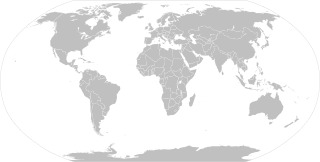 W
WThe selection of the host for the 2032 Summer Olympics saw a new process being introduced from 2019. The bidding process saw Brisbane, Queensland, Australia, chosen as the preferred and expected host that was officially certified by the IOC on the eve of the 2020 Summer Olympics on 21 July 2021 in Tokyo, Japan.
 W
WBound for Glory (2014) was a professional wrestling pay-per-view (PPV) event produced by Total Nonstop Action Wrestling (TNA), in collaboration with Japanese promotion Wrestle-1 (W-1). It took place on October 12, 2014 at the Korakuen Hall in Tokyo, Japan. It was the tenth pay-per-view under the Bound for Glory chronology, the second TNA/W-1 joint event held in Japan in 2014, and the fourth and last event in the 2014 TNA PPV schedule.
 W
WDeparture was a major professional wrestling event produced by Pro Wrestling Noah. The event took place on July 10, 2004 at the Tokyo Dome in Tokyo, Japan, and marked Noah's first ever show in the arena.
 W
WDestiny was a major professional wrestling event produced by Pro Wrestling Noah. The event took place on July 18, 2005 at the Tokyo Dome in Tokyo, Japan, and marked Noah's second event to take place in the arena, after 2004's Departure.
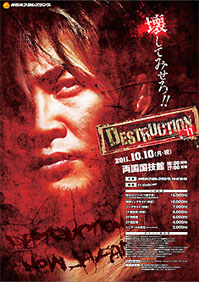 W
WDestruction '11 was a professional wrestling pay-per-view (PPV) event promoted by New Japan Pro-Wrestling (NJPW). The event took place on October 10, 2011, in Tokyo, at Ryōgoku Kokugikan. The event featured eleven matches, three of which were contested for championships. It was the fifth event under the Destruction name.
 W
WFinal Burning in Budokan was a professional wrestling pay-per-view (PPV) event promoted by Pro Wrestling Noah, which took place on May 11, 2013, at Nippon Budokan in Tokyo, Japan. Headlined by the retirement match of Kenta Kobashi, all in all, the event featured seven matches and wrestlers from not only Noah, but also All Japan Pro Wrestling (AJPW), Diamond Ring, New Japan Pro-Wrestling (NJPW) and Tenryu Project. Due to Kobashi's high-profile status in the history of Japanese professional wrestling, the event gained mainstream attention in the country. Dave Meltzer of the Wrestling Observer Newsletter called the event the "end of an era in Japanese pro wrestling", drawing parallels to Pelé's 1977 retirement from football.
 W
WFMW 1st Anniversary Show was the first professional wrestling supercard produced by the Japanese professional wrestling promotion Frontier Martial-Arts Wrestling (FMW). The event took place on November 5, 1990 at the Komazawa Gymnasium in Tokyo, Japan and was held to celebrate the first anniversary of FMW, which was founded on July 28, 1989. This was the first edition of the Anniversary Show, FMW's biggest event of the year.
 W
WFMW 11th Anniversary Show: Backdraft was a professional wrestling pay-per-view (PPV) event produced by Frontier Martial-Arts Wrestling (FMW). The event took place on May 5, 2000 at Komazawa Gymnasium in Tokyo, Japan. The event commemorated the eleventh anniversary of FMW.
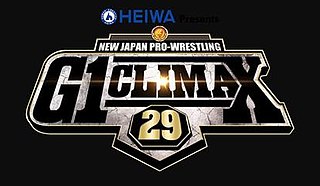 W
WThe G1 Climax 29 was a professional wrestling tournament promoted by the Japan-based New Japan Pro-Wrestling (NJPW). The tournament commenced on July 6 and concluded on August 12, 2019. It is the twenty-ninth edition of G1 Climax, and forty-fifth edition of the tournament counting its previous forms under different names. A Block winner Kota Ibushi defeated B Block winner Jay White in the final to win the tournament.
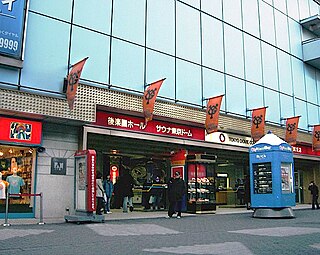 W
WGoodbye Hayabusa II: Haunted House was a professional wrestling live event produced by Frontier Martial-Arts Wrestling (FMW) as part of the Goodbye Hayabusa tour on August 20, 1999 at the Korakuen Hall in Tokyo, Japan. The tour would feature the end of the Hayabusa character in FMW.
 W
WGoodbye Hayabusa II: Hayabusa Graduation Ceremony was a professional wrestling pay-per-view (PPV) event produced by Frontier Martial-Arts Wrestling (FMW). The event was taped on August 23, 1999 and aired on pay-per-view via broadcast delay on DirecTV on August 25. This event was a part of the Goodbye Hayabusa tour used as build-up to the retirement of Eiji Ezaki's "Hayabusa" character and switch to a new character.
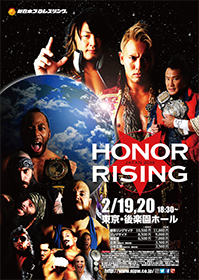 W
WHonor Rising: Japan 2016 was a two-day professional wrestling "supershow" event co-produced by the Japanese New Japan Pro-Wrestling (NJPW) and American Ring of Honor (ROH) promotions. The event took place on February 19 and 20, 2016, at Korakuen Hall in Tokyo, Japan. Both shows aired live through NJPW's internet streaming site, NJPW World. Matches from the shows also began airing on Ring of Honor Wrestling in April 2016.
 W
WHonor Rising: Japan 2017 was a two-day professional wrestling "supershow" event co-produced by the Japanese New Japan Pro-Wrestling (NJPW) and American Ring of Honor (ROH) promotions. The shows took place on February 26 and 27, 2017, at Korakuen Hall in Tokyo, Japan.
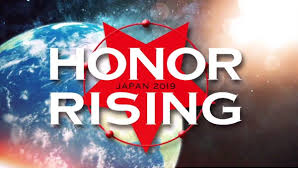 W
WHonor Rising: Japan 2019 was a two-day professional wrestling supershow event co-produced by the Japanese New Japan Pro-Wrestling (NJPW) and the American Ring of Honor (ROH) promotions. The shows took place on February 22 and 23, 2019, at the Korakuen Hall in Tokyo, Japan and were streamed live on NJPW World.
 W
WKaisen: Outbreak (開戦~Outbreak~) was a professional wrestling event produced by the Wrestle-1 promotion (W-1), that took place on March 2, 2014, at Ryōgoku Kokugikan in Tokyo, Japan. For the event – W-1's first at Ryōgoku Kokugikan – the promotion collaborated with American promotion Total Nonstop Action Wrestling (TNA), the first of two W-1/TNA joint events in 2014.
 W
WLion's Gate is the developmental branch of professional wrestling promotion New Japan Pro-Wrestling (NJPW), which holds events under the banner of Lion's Gate Project. The branch was officially announced on July 18, 2015, and held its first show on February 25, 2016. In addition to NJPW wrestlers, the Lion's Gate Project shows also feature wrestlers from other promotions, resulting in unique cards.
 W
WThe Lucha Libre World Cup was a two-day professional wrestling event and tournament organized by Mexican professional wrestling promotion Lucha Libre AAA Worldwide (AAA) with the financial backing of the Grupo Modelo brewery, with Victoria Beer as the official sponsor. The tournament took place on October 9 and October 10 in Tokyo's Shin-Kiba 1st Ring and Korakuen Hall venues, marking the first time the tournament has been held outside AAA's home country of Mexico. The 2017 edition of the tournament also marked the first to feature traditional two-man tag teams, as the previous tournaments had featured a number of three-man tag teams, referred to as trios in Lucha Libre. The tournament showcased teams representing numerous international promotions such as the Inoki Genome Federation (IGF), Impact Wrestling, and Pro Wrestling Noah among others.
 W
WUltimate Crush was a major professional wrestling event promoted by New Japan Pro-Wrestling (NJPW). The event took place on May 2, 2003, at the Tokyo Dome in Tokyo, Japan. The card contained a mixture of pro wrestling matches and mixed-martial arts fights. The show was headlined by Yoshihiro Takayama defending the NWF Heavyweight Championship against Yuji Nagata, who also defended the IWGP Heavyweight Championship in a unification match.
 W
WRyōgoku Peter Pan 2013: Pro-Wrestling Orientation And Measures was a professional wrestling event promoted by DDT Pro-Wrestling (DDT). The event took place on August 18, 2013, in Tokyo at the Ryōgoku Kokugikan. The event featured ten matches, four of which were contested for championships. The event aired on Fighting TV Samurai.
 W
WRyōgoku Peter Pan 2016: The Hottest Summer In The World was a professional wrestling event promoted by DDT Pro-Wrestling (DDT). The event took place on August 28, 2016, in Tokyo at the Ryōgoku Kokugikan. The event featured twelve matches, six of which were contested for championships. The event aired on Fighting TV Samurai.
 W
WRyōgoku Peter Pan 2018: Fall Pro-Wrestling Cultural Festival was a professional wrestling event promoted by DDT Pro-Wrestling (DDT). The event took place on October 21, 2018, in Tokyo at the Ryōgoku Kokugikan. The event, named after the traditional Japanese cultural festivals, featured twelve matches, two of which were contested for championships. The event aired on Fighting TV Samurai and was the first Peter Pan event to be held in the fall.
 W
WSummer Struggle in Jingu was a professional wrestling event promoted by New Japan Pro-Wrestling (NJPW). The event took place on August 29, 2020, in Tokyo, Japan at Meiji Jingu Stadium.
 W
WSuper J-Cup: 1st Stage was the first Super J-Cup professional wrestling tournament hosted by New Japan Pro-Wrestling (NJPW). The event took place on April 16, 1994, at Sumo Hall in Tokyo, Japan. The tournament featured fourteen junior heavyweight wrestlers and was created by Jushin Thunder Liger and was the first NJPW event to feature only junior heavyweight wrestlers. The event received critical acclaim and commercial success, leading to Japanese promotions hosting more editions of the tournament, leading to the event being renamed the Super J-Cup: 1st Stage in later years.
 W
WSuper J-Cup: 5th Stage – Land of Confusion was the fifth Super J-Cup professional wrestling single-elimination tournament produced by New Japan Pro-Wrestling (NJPW). It was a two-night event taking place on December 22 and December 23, 2009 at the Korakuen Hall in Tokyo, Japan. The interpromotional tournament featured junior heavyweight wrestlers from various Japanese promotions, marking its return after a five-year hiatus, last held in 2004. This was the second time that NJPW was hosting the event, the first time being the inaugural tournament in 1994, while the 1995, 2000 and 2004 editions were hosted by different promotions.
 W
WSuper J-Cup: 6th Stage was the sixth Super J-Cup professional wrestling single-elimination tournament produced by New Japan Pro-Wrestling (NJPW). It was a two-night event, taking place on July 20, 2016 and August 21, 2016. The first round held on July 20 took place at the Korakuen Hall in Tokyo, Japan, while the next three rounds took place on August 21 at the Ariake Coliseum in Tokyo, Japan. The tournament featured interpromotional matches between junior heavyweight wrestlers from various Japanese promotions as well as North American promotions. Kushida defeated Yoshinobu Kanemaru in the final round on August 20 to win the 2016 Super J-Cup tournament.
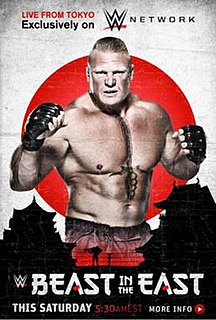 W
WThe Beast in the East was a professional wrestling live event produced by WWE. It aired exclusively on the WWE Network. The event took place on July 4, 2015, at the Ryōgoku Kokugikan in Sumida, Tokyo, Japan. In addition to its live broadcast on the WWE Network, J Sports also carried the event live in Japan.
 W
WThe Tokyo Marathon is an annual marathon sporting event in Tokyo, the capital of Japan. It is an World Athletics Platinum Label marathon and one of the six World Marathon Majors. The latest edition of the race took place on 1 March 2020. It is sponsored by Tokyo Metro.
 W
WTriplemanía VIII was the eighth Triplemanía professional wrestling show promoted by AAA. The show took place on July 5, 2000 in Tokyo, Japan. It was only the second show to take place outside Mexico and the first show to take place in Japan. The Main event featured an Eight-man "Atómicos" tag team match which saw AAA regulars team up with various Japanese wrestlers. The team of Octagón, Jushin Thunder Liger, Latin Lover, and El Alebrije took on Cibernético, Shiima Nobunaga, Abismo Negro, and Electroshock.
 W
WTripleSEM was a professional wrestling major show event produced in cooperation between Pro Wrestling Noah and AAA on September 3, 2007, held in Tokyo, Japan and shown live on Gaora TV. The show is so far the only joint NOAH/AAA promoted show, but as the companies still work together there is potential for further joint shows in the future. The show was held under NOAH's "Pro Wrestling SEM" banner, a subdivision of NOAH dedicated to training younger wrestlers. The main event saw Los Hell Brothers wrestle to a no contest against Mushiking Terry, Naomichi Marufuji and Ricky Marvin.
 W
WUltimate Party 2019: DDT Group Big Gathering! was a professional wrestling event promoted by DDT Pro-Wrestling (DDT). The event took place on November 3, 2019, in Tokyo at the Ryōgoku Kokugikan. It was the first event under the Ultimate Party chronology. The event featured fourteen matches, nine of which were contested for championships. The event aired live on DDT's streaming service DDT Universe.
 W
WUltimate Party 2020 was a professional wrestling event produced by CyberFight's DDT Pro-Wrestling (DDT). The event took place on November 3, 2020, in Tokyo at the Ota City General Gymnasium. It was the second event under the Ultimate Party chronology. The event aired live on AbemaTV and on DDT's streaming service Wrestle Universe.
 W
WRevolution Rumble '94 in Ryōgoku Kokugikan was a major professional wrestling supercard event produced by Wrestling and Romance on March 2, 1994 at the Ryōgoku Kokugikan in Tokyo, Japan. The event was a success as it drew a crowd of 11,000 fans.
 W
WWrestle Kingdom 7 in Tokyo Dome was a professional wrestling pay-per-view (PPV) event produced by the New Japan Pro-Wrestling (NJPW) promotion, which took place at the Tokyo Dome in Tokyo, Japan on January 4, 2013. It was the 22nd January 4 Tokyo Dome Show and the seventh held under the "Wrestle Kingdom" name. The event featured eleven matches, five of which were contested for championships. Wrestle Kingdom is traditionally NJPW's biggest event of the year and has been described as their equivalent to WWE's WrestleMania.
 W
WWrestle Kingdom 8 in Tokyo Dome was a professional wrestling pay-per-view (PPV) event produced by the New Japan Pro-Wrestling (NJPW) promotion, which took place at the Tokyo Dome in Tokyo, Japan on January 4, 2014. It was the 23rd January 4 Tokyo Dome Show and the eighth held under the "Wrestle Kingdom" name. Like the previous year, the event aired worldwide on internet pay-per-view (iPPV). Wrestle Kingdom is traditionally NJPW's biggest event of the year and has been described as their equivalent to WWE's WrestleMania.
 W
WWrestle Kingdom 9 in Tokyo Dome was a professional wrestling pay-per-view event produced by the New Japan Pro-Wrestling (NJPW) promotion, which took place at the Tokyo Dome in Tokyo, Japan on January 4, 2015. It was the 24th January 4 Tokyo Dome Show and the first event on the 2015 NJPW schedule. The event featured ten professional wrestling matches and one pre-show match, six of which were for championships.
 W
WWrestle Kingdom 10 in Tokyo Dome was a professional wrestling pay-per-view (PPV) event promoted by New Japan Pro-Wrestling (NJPW). The event took place on January 4, 2016, in Tokyo, Japan, at the Tokyo Dome. It was the 25th January 4 Tokyo Dome Show, which is NJPW's biggest annual event and has been called "the largest wrestling show in the world outside of the United States" and the "Japanese equivalent to the Super Bowl". The event featured ten matches and was main evented by Kazuchika Okada defending the IWGP Heavyweight Championship against Hiroshi Tanahashi.
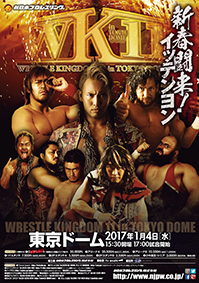 W
WWrestle Kingdom 11 in Tokyo Dome was a professional wrestling event promoted by New Japan Pro-Wrestling (NJPW). The event took place on January 4, 2017, at the Tokyo Dome in Tokyo, Japan. It was the 26th January 4 Tokyo Dome Show, which is NJPW's biggest annual event and has been called "the largest wrestling show in the world outside of the United States" and the "Japanese equivalent to the Super Bowl".
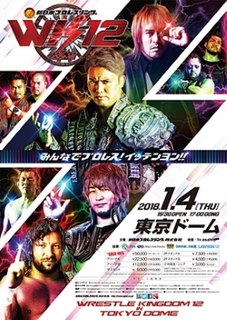 W
WWrestle Kingdom 12 in Tokyo Dome was a professional wrestling event promoted by New Japan Pro-Wrestling (NJPW). The event took place on January 4, 2018, at the Tokyo Dome in Tokyo, Japan. It was the 27th January 4 Tokyo Dome Show, which is NJPW's biggest annual event and has been called "the largest wrestling show in the world outside of the United States" and the "Japanese equivalent to the Super Bowl".
 W
WWrestle Kingdom 13 in Tokyo Dome was a professional wrestling event produced by New Japan Pro-Wrestling (NJPW). The event took place on January 4, 2019 at the Tokyo Dome in Tokyo, Japan. It was the twenty-eighth January 4 Tokyo Dome Show and the thirteenth promoted under the Wrestle Kingdom name. The event was streamed live on NJPW World and FITE TV and was aired on tape delay on AXS TV. Wrestle Kingdom is traditionally NJPW's biggest event of the year and has been described as their equivalent to WWE's WrestleMania.
 W
WWrestle Kingdom 14 in Tokyo Dome was a two-night professional wrestling pay-per-view (PPV) event produced by New Japan Pro-Wrestling (NJPW). The event took place on January 4 and 5, 2020, at the Tokyo Dome, in Tokyo, Japan. It was the 29th January 4 Tokyo Dome Show and the 14th promoted under the Wrestle Kingdom name; it was also the first time the event was held over two days, instead of taking place solely on January 4.
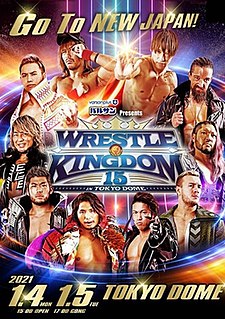 W
WWrestle Kingdom 15 in Tokyo Dome was a professional wrestling pay-per-view (PPV) event produced by New Japan Pro-Wrestling (NJPW). The event took place over two nights, on January 4 and 5, 2021 at the Tokyo Dome in Tokyo, Japan. It was the 30th January 4 Tokyo Dome Show and the 15th promoted under the Wrestle Kingdom name.
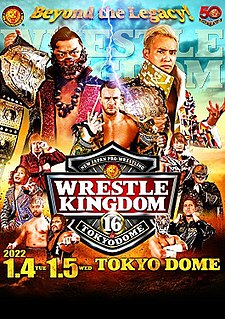 W
WWrestle Kingdom 16 was a three-day professional wrestling pay-per-view (PPV) event co-produced by the New Japan Pro-Wrestling (NJPW) and Pro Wrestling Noah (Noah) promotions. The event took place on January 4 and 5, 2022, at the Tokyo Dome, in Tokyo and January 8, at Yokohama Arena in Yokohama, Japan. It was the 31st January 4 Tokyo Dome Show and the 16th promoted under the Wrestle Kingdom name; it was also the first time the event was held over three days and the first one to take place in Yokohama. It marked the first January 4 Tokyo Dome Show since 2007's Wrestle Kingdom I to be co-produced with another wrestling promotion.
 W
WWrestle Kingdom in Tokyo Dome was a professional wrestling pay-per-view (PPV) event co-produced by the New Japan Pro-Wrestling (NJPW) and All Japan Pro Wrestling (AJPW) promotions, which took place at the Tokyo Dome in Tokyo, Japan on January 4, 2007. It was the 16th January 4 Tokyo Dome Show and the first held under the new "Wrestle Kingdom" name. Wrestle Kingdom is traditionally NJPW's biggest event of the year and has been described as their equivalent to WWE's WrestleMania.
 W
WWrestle Kingdom II in Tokyo Dome was a professional wrestling pay-per-view (PPV) event produced by the New Japan Pro-Wrestling (NJPW) promotion, which took place at the Tokyo Dome in Tokyo, Japan on January 4, 2008. It was the 17th January 4 Tokyo Dome Show and the second held under the "Wrestle Kingdom" name. The event featured ten matches, four of which were contested for championships. Wrestle Kingdom is traditionally NJPW's biggest event of the year and has been described as their equivalent to WWE's WrestleMania.
 W
WWrestle Kingdom III in Tokyo Dome was a professional wrestling pay-per-view (PPV) event produced by the New Japan Pro-Wrestling (NJPW) promotion, which took place at the Tokyo Dome in Tokyo, Japan on January 4, 2009. It was the 18th January 4 Tokyo Dome Show and the third held under the "Wrestle Kingdom" name. The event featured eleven matches, five of which were contested for championships. Wrestle Kingdom is traditionally NJPW's biggest event of the year and has been described as their equivalent to WWE's WrestleMania.
 W
WWrestle Kingdom IV in Tokyo Dome was a professional wrestling pay-per-view (PPV) event produced by the New Japan Pro-Wrestling (NJPW) promotion, which took place at the Tokyo Dome in Tokyo, Japan on January 4, 2010. It was the 19th January 4 Tokyo Dome Show and the fourth held under the "Wrestle Kingdom" name. The event featured ten matches, five of which were contested for championships. Wrestle Kingdom is traditionally NJPW's biggest event of the year and has been described as their equivalent to WWE's WrestleMania.
 W
WWrestle Kingdom V in Tokyo Dome was a professional wrestling pay-per-view (PPV) event produced by the New Japan Pro-Wrestling (NJPW) promotion, which took place at the Tokyo Dome in Tokyo, Japan on January 4, 2011. It was the 20th January 4 Tokyo Dome Show and the fifth held under the "Wrestle Kingdom" name. The event featured thirteen matches, four of which were contested for championships. Wrestle Kingdom is traditionally NJPW's biggest event of the year and has been described as their equivalent to WWE's WrestleMania.
 W
WWrestle Kingdom VI in Tokyo Dome was a professional wrestling pay-per-view (PPV) event produced by the New Japan Pro-Wrestling (NJPW) promotion, which took place at the Tokyo Dome in Tokyo, Japan on January 4, 2012. It was the 21st January 4 Tokyo Dome Show and the sixth held under the "Wrestle Kingdom" name. This was the final Wrestle Kingdom where a Roman numeral was used as part of the event's name. The event featured twelve matches, three of which were contested for championships. Wrestle Kingdom is traditionally NJPW's biggest event of the year and has been described as their equivalent to WWE's WrestleMania.
 W
WWrestle Peter Pan 2019 was a Japanese professional wrestling event promoted by DDT Pro-Wrestling (DDT). The event took place on July 15, 2019, in Tokyo at the Ota City General Gymnasium. The event featured thirteen matches, five of which were contested for championships. The event aired on Fighting TV Samurai and on DDT's video on demand service DDT Universe. This was the first Peter Pan event to have its name written in rōmaji.
 W
WWrestle Peter Pan 2020 was a two-night professional wrestling pay-per-view (PPV) event produced by DDT Pro-Wrestling (DDT). The event took place on June 6 and 7, 2020, at the DDT TV Show Studio, in Tokyo, Japan. It was the 12th DDT Peter Pan show and the 2nd promoted under the Wrestle Peter Pan name; it was also the first time the event was held over two days. The event aired on DDT's video on demand service Wrestle Universe with the second night of the event also airing on AbemaTV.
 W
WYear End Spectacular (1996) was the third and final Year End Spectacular professional wrestling event produced by Frontier Martial-Arts Wrestling on December 11, 1996. The event was a part of the 1996 Year End Sensation tour, which concluded with the Year End Spectacular event.